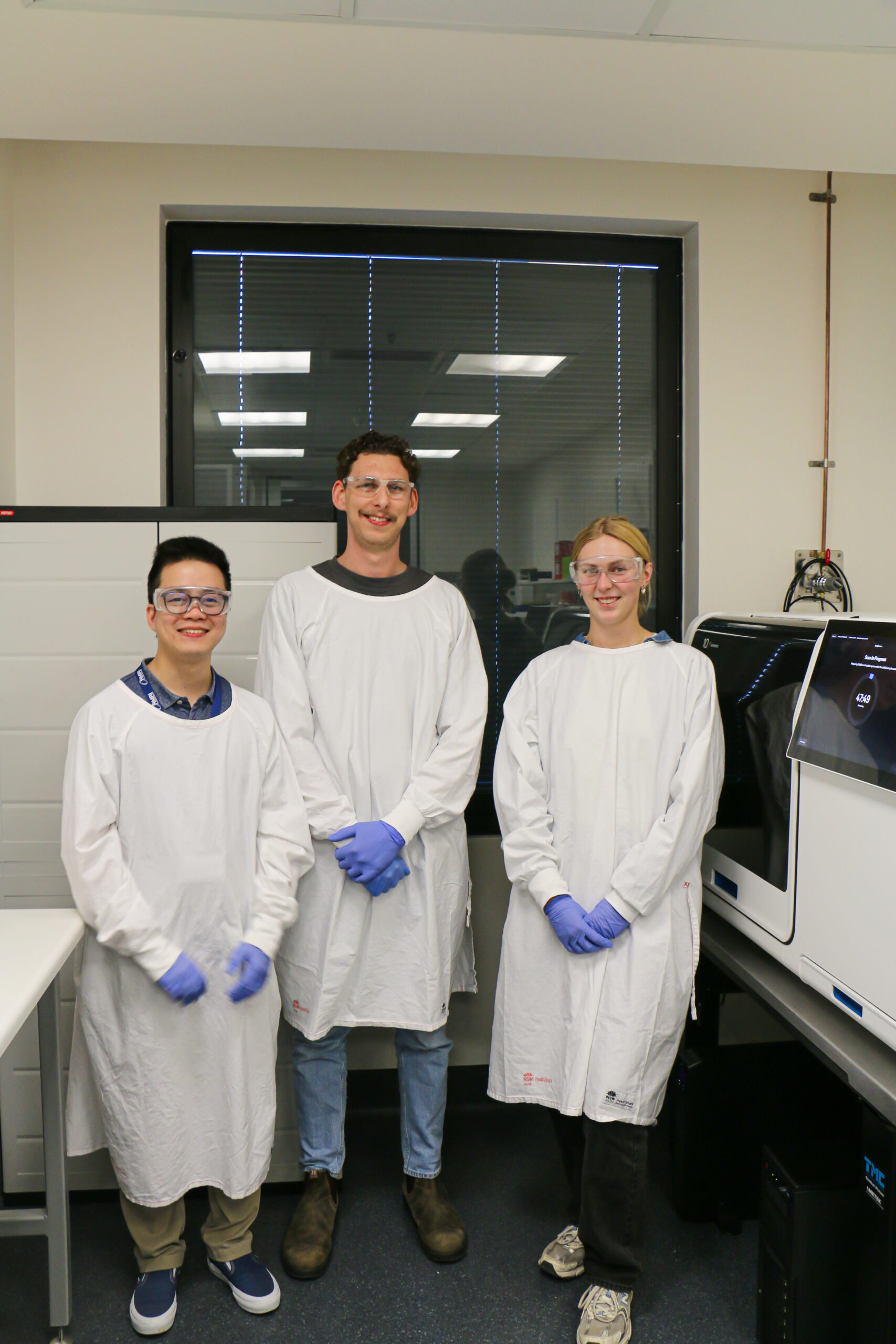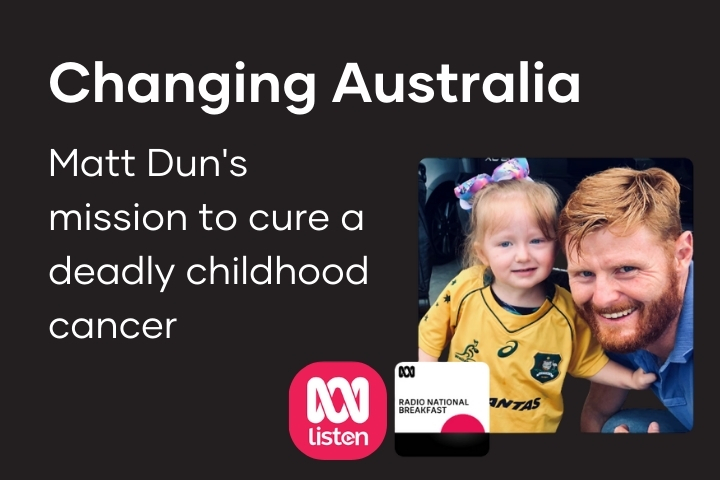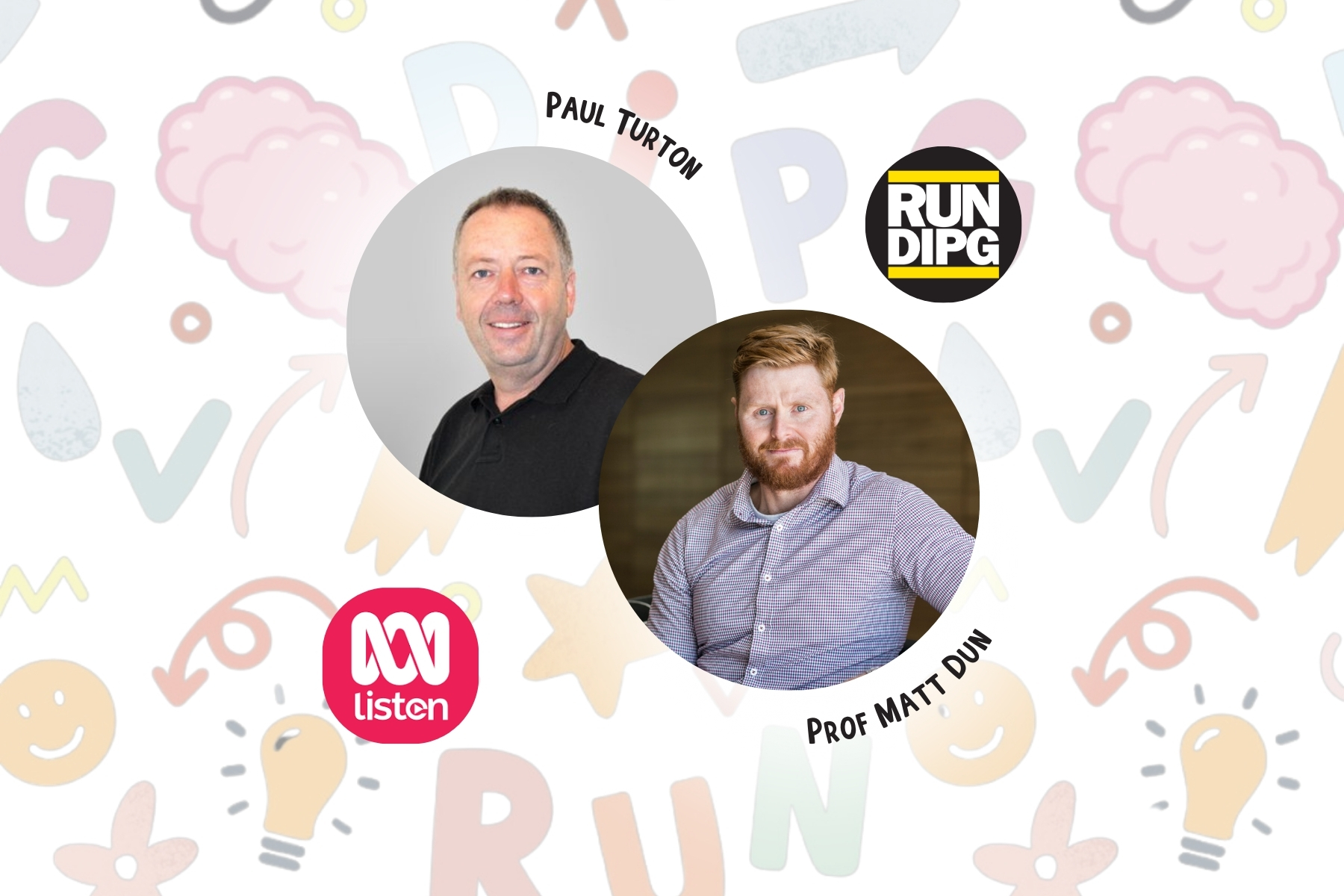DIPG/DMG Research Projects supported by RUN DIPG
When we say we fund research, we mean it. RUN DIPG directly supports groundbreaking projects, cutting-edge equipment, and the brightest scientific minds to drive progress against DIPG/DMG. Money raised helps fuel targeted initiatives designed to uncover better treatments, improve outcomes, and ultimately find a cure. This is how we move closer to making a real difference—by investing in the people, tools, and ideas that give families hope for the future.

Dr Tuan Vo, Dr Zac Germon & Mika Persson standing with the 10x Genomics Chromium, Xenium and Visium package machine.
Investigating combination therapies on an international scale
Developed thanks to RUN DIPG-funded research.
As confronting as a DIPG/DMG diagnosis is, the realisation that there are no recognised treatment options for the condition is truly heartbreaking. Upon diagnosis, families are given the option to undergo radiation therapy (RT) in an attempt to shrink the tumour and reduce symptoms of the disease.
Following a DIPG/DMG diagnosis, families often begin a desperate search for experimental options that may help give their child ‘more time’. This may be in the form of a clinical trial and requires patients meet certain criteria if they are to be eligible to receive the drug being studied. Eligibility criteria exist so that researchers can be sure that any benefit (or harm) observed in the trial can be attributed to the medicine being studied and not individual circumstance (as best as possible).
For many families, finding a clinical trial that their child qualifies for means they must travel overseas, a significant financial, logistical and emotional process. It is for this reason, that one of RUN DIPG’s major goals is to support the opening of ‘Combination Therapy for the Treatment of Diffuse Midline Gliomas’ (nicknamed “DMG-ACT”)– an international, adaptive clinical trial studying combination therapies against DIPG/DMG, with the flexibility of adding or switching the drug of interest based on the latest findings of the field.
Notably, Professsor Matt Dun and the Cancer Signalling Research Group have contributed to much of the groundwork in the development of the DMG-ACT trial protocol. Two drugs to be studied include paxalisib and ONC201, a combination that Josie Dun was the first child to receive worldwide, thanks to the pre-clinical studies Matt and the team worked hard to complete following Josie’s diagnosis.
With 23 collaborating sites expected to participate worldwide, we cannot wait to see DMG-ACT open for local enrolments. Professor Matt Dun and the University of Newcastle team are working with the Australian and New Zealand Children’s Oncology and Haematology Group (ANZCHOG) responsible for coordinating national trials such as these in Australia.
We at RUN DIPG are committed to facilitating the process; it will be thanks to our supporters that Australian families facing DIPG/DMG finally have accessible treatment options, fully back by rigorous scientific method and without the need for international travel.
Currently enrolling in the United States, you can read more about the clinical trial via the Pacific Pediatric Neuro-Oncology Consortium’s website .
Essential Equipment
Spatial Transcriptomics Platform, December 2023, $998,360
An emerging but critical technology to the field, RUN DIPG was able to purchase the 10x Genomics Chromium, Xenium and Visium package at the end of 2023. Together, the platform will greatly enhance the resolution of the Dun Lab’s ability to precisely interrogate the biological drivers of DIPG/DMG. Rather than analysing features within an entire tissue sample, they will be able to analyse the components within individual tumour cells, including quantification and localisation, as well as the interactions between tumour cells and other cell types. Being able to map tumour growth patterns and the complex interplay between the tumour and surrounding cells, will provide crucial insight into where and how tumours are progressing. Consequently, the Dun Lab can now investigate new sequential combination therapy approaches that aim to switch treatment before resistance develops (rather than the current ‘use to failure’ paradigm that has not provided long term survival).
Haematology Analyser, August 2023, $54,758
This machine helps the Dun Lab understand the safety of experimental DIPG therapies. Where a new drug or treatment approach is tested in research mice, Dr Duchatel and Dun lab researchers analyse the blood of the mice post-treatment. Just like your GP may order you a blood test to understand your health, the haematology analyser will identify whether the experimental therapy has caused unacceptable stress on liver, kidney or other organ systems – critical information required prior to moving to human clinical trials.
The Wish Lab, March 2022, $834,123
In memory of Ms Jemima Gazley (and home to the likeness of many precious friends since), the Wish Lab is a bespoke cell culture facility established at University of Newcastle. ‘Cell Culture’ refers to growing DIPG/DMG cancer cells in a controlled environment, using flasks (think bottle-shaped petri dish) to store, feed and grow cells for study purposes. The Wish Lab is also home to the ‘JEM-BOT’, a cell culture robot used to streamline repetitive handling tasks in a high-throughput manner. Forming the base of all DIPG/DMG experiments carried out by the Dun Lab, the Wish Lab is in constant use at UON.
Preclinical Irradiator, December 2021, $281,075
A key tool of the Dun Lab, the irradiator allows the team to mimic the effects of radiation therapy in the lab environment. Given RT is the only standard-of-care offering for patients diagnosed with DIPG/DMG, this equipment ensures the Dun Lab can study how to improve response to radiation treatment, and its effect in combination with other experimental therapies.
Ultra-low temperature freezer, November 2021, $63,191
This 150L tank uses liquid nitrogen to store precious patient samples at -80 degrees. Keeping the material frozen means the specimens can be prepared and analysed under different conditions as more information or candidate therapies come to light. 2.5 years on, the Dun Lab have ticked over 50% capacity, a testament to the hard work performed by the team and the generosity of patients and families willing to further DIPG/DMG research.
BRIGHT MINDS
Research Assistant, 2020-2021, $90,448
A research laboratory is a complex setting. There’s academic and professional staff, there’s undergraduate and postgraduate students, there’s volunteers, visitors and of course, the boss! With RUN DIPG’s funding, the Dun Lab welcomed a Research Assistant to the team in 2020, a critical extra set of hands to support the multiple projects ongoing within the University of Newcastle team. A research assistant has a scientific background, plus technical training to ensure experimental assays are performed in a scientifically rigorous, safe, and efficient manner.
The RUN DIPG International PhD Scholarship, 2020-2024, $108,251
Ms Mika Persson (finally) joined the Dun Lab in 2020… hailing from Sweeden, and unable to enter Australia throughout the COVID-19 lockdowns, Mika found herself commencing her postgraduate studies in the laboratory of Prof Dun’s mentor at Southern Denmark University. Supported by RUN DIPG, Mika has been paying particular attention to the surface of DIPG tumour cells throughout her tenure as she searches for a novel characteristic that can be targeted using immune-based therapies. As immune therapy has revolutionised the survival of melanoma and some blood cancers, we are hopeful Mika can find a similarly effective target for DIPG/DMG.
The RUN DIPG ‘Moving Towards a Cure’ PhD Scholarship, 2022-2025, $108,000
Izac Findlay commenced his PhD in 2022, investigating the ‘Pharmaco-Phospho-Proteo-Genomics of Paediatric High-Grade Glioma’ – in lay terms, understanding the interplay between genes, proteins and protein activity in high-risk brain cancer, and finding drugs that will target these intricate features. Izac has diligently prepared an enormous number of DIPG tumour samples for inclusion in his project, the next phase seeing him undertake training in data analysis and integration at the Swiss Federal Institute of Technology Lausanne with thanks to RUN DIPG’s continued support.
Collaborative Travel Grant – Dr Clara Savary, July 2023, February 2024, $10,000+$1,405.27
French collaborator Dr Clara Savary joined the Dun Lab in 2023 for 12 weeks thanks to the support of RUN DIPG. As a bioinformatician, Dr Savary shared critical knowledge and workflows with the Dun Lab team as they endeavour to interpret the datasets generated through their work. RUN DIPG has provided further support in 2024, with a second visit to University of Newcastle allowing Dr Savary to work more closely with each team member on their specific projects.
RUN DIPG ‘Warrior Jack’ PhD Scholarship, 2024-2027, $135,312
After a long search for the qualified candidate, Yuanhao Jiang joined the University of Newcastle team in June as the RUN DIPG Warrior Jack Scholar. A specialist project based in bioinformatics, Yuanhao will investigate the effect of DNA methylation (a chemical modification that occurs within the body) in DIPG, and how this phenomenon impacts the cell signalling pathways that control tumour growth. Assessing a large number of DIPG/DMG samples, Yuanhao will look at whether tumours group in a certain way based on methylation patterns, and whether this grouping aligns with response or resistance to certain therapies. As we know, there are no specified treatment for DIPG (other than palliative radiation therapy) and so we are hopeful the project will shed some light on which tumours need which treatments.
Paediatric Brain Cancer Clinical Nurse Specialist, 2021-2024, $86,662
- Providing information and education regarding therapy recommended by the paediatric oncologist
- Provide emotional and supportive care
- Facilitate coordination of services and continuity of care within the context of and interdisciplinary team approach
- Facilitate and support enrolment and conduct of both clinical and preclinical trials
- Initiate and collaborate research including psychosocial research, both local and with national and international centres who treat brain tumours
- To promote patient and family empowerment incorporating active coping, cancer self-management and social support
- To identify barriers to care and facilitate referral to mitigate these barriers
- Support a smooth transition of patients from active therapy into survivorship or end of life care.
POWERFUL PROJECTS
Genomic sequencing, December 2020, $85778
The crux of DIPG/DMG tumours undoubtedly lies in their biology; Prof Matt Dun and the Dun Lab were able to focus on the gene-controlled features of these tumours in 2020 thanks to RUN DIPG’s support.
The PHOTON Project, in conjunction with The Kids’ Cancer Project: PHarmaco-phOspho-proTeO-geNomics of paediatric high-grade glioma, 2022-2024, $150,000
Building on preliminary data generated by PhD student Izac Findlay, RUN DIPG funded a pilot study alongside Kids’ Cancer Project to understand whether more/better treatment targets can be identified when we consider both the gene and protein characteristics of a tumour. This is a novel approach; standard analysis provided to paediatric cancer patients includes genome analysis, whereas protein analysis is often unfeasible given the larger amount of tumour tissue required and intricate techniques required to perform the assay. However, if it can be shown that the detailed and expensive work of proteomics can find more/effective treatment targets, this will encourage further funding in support of the approach.
Partnership Funding, in conjunction with Tour De Cure - A chink in the armour of DMG tumours, 2023- 2027, $1,200,000
Our largest grant funding to-date, 2023 saw us partner with Tour De Cure to provide $1.2M in project support over the coming years. Led by long term Dun Lab member, Dr Evie Jackson, the team at University of Newcastle will investigate how to improve patient response to the most promising anti-DIPG therapies we have – radiation, paxalisib and ONC201. Despite being awarded her PhD in November 2023, Dr Jackson is considered an emerging expert on DIPG cancer cell biology. Her efforts alongside Dun Lab team members 2018-2021 saw paxalisib and ONC201 enter international clinical trial, and we are keen to see what comes of her dedication in the project at hand.
Collaborative Research Support, 2023-2025, $56,000
Dr Ryan Duchatel and the Early Career DIPG Researchers of the Dun Lab were supported in their endeavours to participate in, and contribute towards, national and international collaborative projects thanks to RUN DIPG’s funding awarded March 2023. Highlights to-date include Dr Duchatel and Dr Evangeline Jackson’s attendance of the Society of Neuro-Oncology Annual Meeting 2023, held in Vancouver Canada. As well as a second-to-none networking opportunity, Evangeline received the Marit Mary Swenson Award for Pediatric DMG/DIPG for best ‘abstract’ – the short form description of her latest research findings relating to paxalisib and ONC201 (used in the PNOC022 clinical trial).
DIPG/DMG Research Support Hudson Institute of Medical Research, $64,191
RUN DIPG are proud to support the work of Dr Jason Cain at the Hudson Institute, Clayton Victoria. Also a member of the DMG-ACT Pre-clinical Working Group (supporting the latest DMG clinical trial), RUN DIPG has awarded Dr Cain a $64,191.70 contribution to support his team identify new therapies for DIPG. Focused on understanding the mechanisms that drive DIPG/DMG development and progression, we are proud to support critical research needed to improve DIPG survival.
Support at The Children's National Hospital Washington, $80,000
Aiming to understand and enhance the effect of two promising anti-DIPG therapies, RUN DIPG are proud to support the work of Professor Javad Nazarian, at the Children’s National Hospital, Washington D.C, with an $80,000 commitment. Oral therapies ONC201 and paxalisib (that will be studied in the international clinical trial ‘Combination Therapy for the Treatment of Diffuse Midline Gliomas’) will be the focus of Dr Nazarian’s work. His team will look to find ways to improve the rate and duration of response to these two drugs (having previously been deemed safe for paediatric patients) by testing unique triple drug therapy approaches. This work is an extension of past collaborative projects between Prof Nazarian and Professor Matt Dun at the University of Newcastle, Hunter Medical Research Institute. Considered a field leader in DIPG/DMG research, we are looking forward to the insights Prof Nazarian and his team’s work will provide, so that more children may receive robust benefit from ONC201 and paxalisib therapies in their fight against diffuse midline glioma.
DIPG Research at The University of Newcastle Funded by RUN DIPG, 2020-2021, $176,000
The determination of Professor Matt Dun and the Cancer Signalling Research Group (CSRG) did not wane throughout 2020/21 even though many research teams around the world were forced to ‘hit pause’ thanks to COVID-19. RUN DIPG were proud to support this important work throughout such an uncertain time. Granting more than $176,000 in research funding, Professor Matt Dun continued to lead the Cancer Signalling Research Group (CSRG) in an effort to improve the field’s understanding of the underlying mechanisms controlling the growth of DIPG tumours, as well as finding/developing therapies to combat the devastating course of the disease. Based at the University of Newcastle, this funding helped Professor Matt Dun and CSRG to continue the ambitious project (first funded by Tour de Cure) seeking to link a DIPG tumour’s protein cargo (proteome) with its genetic code (genome) to map the tumour’s communication circuits that can then be targeted by new or known treatment options. The crux of this project is that knowledge of either the proteome, or the genome alone, does not ensure a complete understanding of a tumour’s likelihood to respond to, or resist a particular therapy, hence, RUN DIPG have been delighted to be able to keep this important work moving in 2020 and 2021 thanks to our supporters.
Latest articles
$2 million NHMRC grant brings childhood cancer cure step closer
marketinga942b202242025-04-09T10:16:27+10:00The University of Newcastle's research team has been awarded [...]
ABC’s Changing Australia: Matt Dun’s mission to cure a deadly childhood cancer
marketinga942b202242025-03-05T12:31:07+11:00Thank you to ABC's Sally Sara (Journalist) and Nancy [...]




